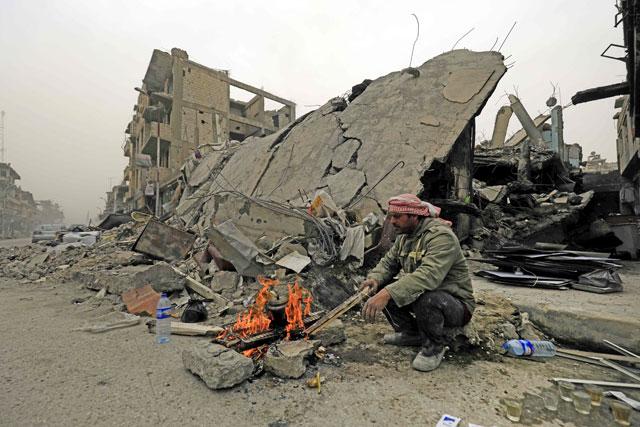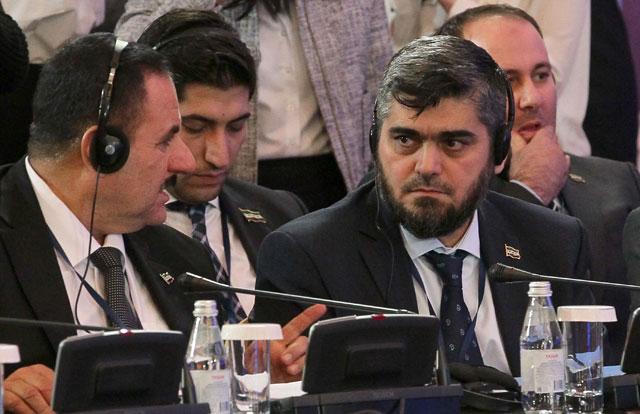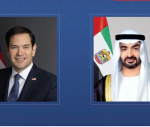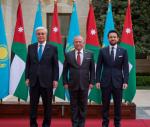You are here
Major powers seek to hold Syria peace congress in late January
By AFP - Dec 23,2017 - Last updated at Dec 23,2017
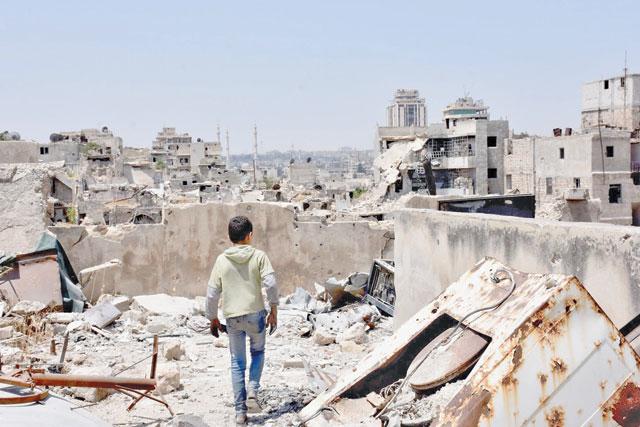
This file photo taken on July 22, 2017, shows a Syrian boy walking amid the rubble of destroyed buildings in the northern city of Aleppo, which was recaptured by government forces in December 2016. Syria's six-year war has claimed more than 340,000 lives, forced millions to flee their homes and left Syria in ruins (AFP photo)
ASTANA, Kazakhstan — Major powerbrokers agreed Friday to hold a peace congress for Syria in Russia's Black Sea resort of Sochi in late January after previous attempts to hold the conference collapsed.
Sochi will host the "Congress of National Dialogue" on Syria on January 29 and 30, said a joint statement released after two days of talks spearheaded by Russia and Iran, both key backers of Syrian President Bashar Al Assad's regime, and rebel-aligned Turkey.
The congress will see "the participation of all segments of Syrian society," said the statement released in the Kazakh capital Astana.
"To this end three guarantors will hold a special preparation meeting in Sochi before the congress on January 19-20," it added, referring to Russia, Turkey and Iran.
But a list of prospective participants was not released and the opposition did not immediately confirm participation.
A previous attempt to convene the Sochi congress in November failed following a lack of agreement among would-be participants.
Turkey has said it will be opposed to any talks involving the Kurdish YPG militia of the Democratic Union Party (PYD).
Russian President Vladimir Putin has been hoping to convert Moscow’s game-changing military intervention in Syria into a political settlement on his terms.
In November, he convened the leaders of Turkey and Iran in Sochi to discuss the plan for the peace conference.
While both Russian officials and Assad have spoken enthusiastically of the plan, rebel representatives have been wary and the United Nations has yet to firmly endorse it.
Head of the Syrian government delegation Bashar Al Jaafari said Friday that the congress would “pose a basis for dialogue between the Syrians”, and confirmed the government would attend.
‘Not a rejection’
The opposition was more cautious, although Ayman Al Aasemi, a member of the opposition delegation in Astana, told AFP there was “an openness to the idea of Sochi”.
“It’s not a rejection. We’ve asked for more details — how often it will meet, what’s the essential goal,” said Aasemi, who also credited Moscow with “opening up” during the latest round of talks.
“According to the Russians, the constitution and the elections will be the main topics.”
“We will go back to our popular base and the people we represent in Syria, and see what our interest is in attending this conference. But in my view, it’s better to attend than not attend.”
The head of the opposition delegation in Astana, Ahmad Tohmeh, said the opposition would have to “hold consultations with our military and political leaders” before confirming participation.
“[The Syrian regime] is participating in peace talks but they are killing our people. How can we talk about a national dialogue?” Tohmeh asked emotionally on Friday.
A cautious UN
UN envoy Staffan de Mistura’s office acknowledged Friday the plan to hold the congress in January without throwing full support behind it.
“The United Nations maintains its view that any political initiative by international actors should be assessed by its ability to contribute to and support the mandated political process under the United Nations in Geneva,” de Mistura’s office said in a statement.
The UN envoy held talks with Russian Foreign Minister Sergei Lavrov and Defence Minister Sergei Shoigu in Moscow on Thursday.
The Astana talks have run in parallel to the negotiations taking place in Geneva with the backing of the United Nations, but neither set of talks have borne much fruit.
Since the start of Syria’s war in 2011, several diplomatic attempts to halt the conflict have stumbled, mainly over Assad’s future.
A fragile ceasefire brokered at the end of last year by Moscow and Ankara has been bolstered somewhat by the negotiations in Astana.
The talks there have focussed on implementing four de-escalation zones to stem fighting between government and rebel forces, among other issues.
But both Damascus and the rebel factions have regularly accused one another of violating the ceasefire the zones were intended to bolster.
The second day of the talks in Astana coincided with the anniversary of a devastating and strategically crucial victory by Syrian forces in Aleppo, the country’s second-largest city and once a rebel stronghold, after a blistering Russian-backed offensive.
Since the victory over Aleppo, Damascus has consolidated control over much of the country, wresting territory from extremist factions not party to the truce, particularly the Daesh terror group.
The war in Syria has left more than 340,000 people dead, according to the Syrian Observatory for Human Rights.
Related Articles
ASTANA, Kazakhstan — Talks on Syria spearheaded by Russia in Astana failed to edge the seven-year conflict closer to a political settlement
ASTANA — Syria's opposition on Thursday said it was more important "than ever before" that Russia push Bashar Assad's government towards a p
ASTANA, Kazakhstan — Syrian regime and rebel representatives failed Thursday to make any breakthroughs at talks in Kazakhstan, as key powerb

Opinion
Feb 19, 2025
- Popular
- Rated
- Commented
Feb 18, 2025
Feb 18, 2025
Newsletter
Get top stories and blog posts emailed to you each day.


